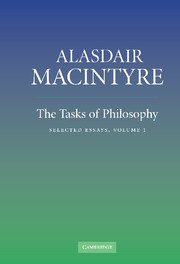Book contents
- Frontmatter
- Contents
- Preface
- Acknowledgments
- PART I DEFINING A PHILOSOPHICAL STANCE
- 1 Epistemological crises, dramatic narrative, and the philosophy of science
- 2 Colors, cultures, and practices
- 3 Moral relativism, truth, and justification
- 4 Hegel on faces and skulls
- 5 What is a human body?
- 6 Moral philosophy and contemporary social practice: what holds them apart?
- PART II THE ENDS OF PHILOSOPHICAL ENQUIRY
- Index
3 - Moral relativism, truth, and justification
Published online by Cambridge University Press: 05 June 2012
- Frontmatter
- Contents
- Preface
- Acknowledgments
- PART I DEFINING A PHILOSOPHICAL STANCE
- 1 Epistemological crises, dramatic narrative, and the philosophy of science
- 2 Colors, cultures, and practices
- 3 Moral relativism, truth, and justification
- 4 Hegel on faces and skulls
- 5 What is a human body?
- 6 Moral philosophy and contemporary social practice: what holds them apart?
- PART II THE ENDS OF PHILOSOPHICAL ENQUIRY
- Index
Summary
TO WHAT ARE THE MOST PLAUSIBLE VERSIONS OF MORAL RELATIVISM A RESPONSE?
Often, if not always, moral relativism is a response to the discovery of systematic and apparently ineliminable disagreement between the protagonists of rival moral points of view, each of whom claims rational justification for their own standpoint and none of whom seems able, except by their own standards, to rebut the claims of their rivals. Examples of such systematic moral conflict are not difficult to find.
Consider for example a certain kind of disagreement about marriage and divorce. Kaibara Ekken, an influential seventeenth-century Japanese NeoConfucian, followed Confucian tradition in arguing that sufficient grounds for a husband to divorce a wife include not only that she is sexually unfaithful, but also that she is disobedient to parents-in-law, or barren, or jealous, or has a serious illness, or engages in frequent gossip and slander, or is a thief. What these grounds provide is evidence of an inability to sustain the social role of a wife, as understood by NeoConfucians. Further justification of these claims would be provided by considering the place of the role of wife and mother within the family, the relationship of the structure of the family to that of the social and political order and the way in which both of these give expression to a cosmic order, recognized in that practice of the virtues in which an understanding of what is appropriate for each role is embodied.
- Type
- Chapter
- Information
- The Tasks of PhilosophySelected Essays, pp. 52 - 73Publisher: Cambridge University PressPrint publication year: 2006
- 5
- Cited by



